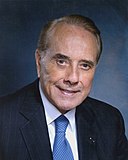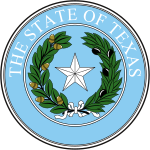
The 1996 United States presidential election was the 53rd quadrennial presidential election, held on Tuesday, November 5, 1996. Incumbent Democratic President Bill Clinton defeated former Senate Majority Leader Bob Dole, the Republican nominee, and Ross Perot, the Reform Party nominee and 1992 Independent presidential candidate.

The 1992 United States presidential election was the 52nd quadrennial presidential election, held on Tuesday, November 3, 1992. Democratic Governor Bill Clinton of Arkansas defeated incumbent Republican President George H. W. Bush and independent businessman Ross Perot of Texas. The election marked the end of a period of Republican dominance in American presidential politics that began in 1968, and also marked the end of 12 years of Republican rule of the White House, as well as the end of the Greatest Generation's 32-year American rule and the beginning of the baby boomers' 28-year dominance until 2020. It was the last time the incumbent president failed to win a second term until Donald Trump in 2020.

The Reform Party of the United States of America (RPUSA), generally known as the Reform Party USA or the Reform Party, is a centrist political party in the United States, founded in 1995 by Ross Perot.

Super Tuesday is the United States presidential primary election day in February or March when the greatest number of U.S. states hold primary elections and caucuses. Approximately one-third of all delegates to the presidential nominating conventions can be won on Super Tuesday, more than on any other day. The results on Super Tuesday are therefore a strong indicator of the likely eventual presidential nominee of each political party.

The Republican National Convention (RNC) is a series of presidential nominating conventions held every four years since 1856 by the Republican Party in the United States. They are administered by the Republican National Committee. The goal of the Republican National Convention is to officially nominate and confirm a candidate for president and vice president, adopt a comprehensive party platform and unify the party, as well as publicize and launch the fall campaign.

The 1996 United States Senate elections were held on November 5, with the 33 seats of Class 2 contested in regular elections. Special elections were also held to fill vacancies. They coincided with the presidential election of the same year, in which Democrat Bill Clinton was re-elected president.
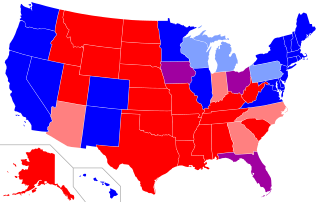
Starting with the 2000 United States presidential election, the terms "red state" and "blue state" have referred to U.S. states whose voters vote predominantly for one party — the Republican Party in red states and the Democratic Party in blue states — in presidential and other statewide elections. By contrast, states where the vote fluctuates between the Democratic and Republican candidates are known as "swing states" or "purple states". Examining patterns within states reveals that the reversal of the two parties' geographic bases has happened at the state level, but it is more complicated locally, with urban-rural divides associated with many of the largest changes.

Texas's 14th congressional district for the United States House of Representatives stretches from Freeport to Orange, Texas. It formerly covered the area south and southwest of the Greater Houston region, including Galveston, in the state of Texas.

From January 29 to June 4, 1996, voters of the Republican Party chose its nominee for president in the 1996 United States presidential election. Senator Bob Dole of Kansas, the former Senate majority leader, was selected as the nominee through a series of primary elections and caucuses culminating in the 1996 Republican National Convention held from August 12 to 15, 1996, in San Diego, California. Dole resigned from the Senate in June 1996 once he became the presumptive nominee to concentrate on his presidential campaign. He chose Jack Kemp as his running mate.

Elections in Wisconsin are held to fill various local, state, and federal seats. Special elections may be held to fill vacancies at other points in time.

The 2012 United States presidential election in Tennessee was held on November 6, 2012, as part of the 2012 United States presidential election in which all 50 states plus the District of Columbia participated. Tennessee voters chose 11 electors to represent them in the Electoral College via a popular vote pitting incumbent Democratic President Barack Obama and his running mate, Vice President Joe Biden, against Republican challenger and former Massachusetts Governor Mitt Romney and his running mate, Congressman Paul Ryan.

The 2012 United States presidential election in Texas took place on November 6, 2012, as part of the 2012 United States presidential election in which all 50 states plus the District of Columbia participated. Texas voters chose 38 electors to represent them in the Electoral College via a popular vote pitting incumbent Democratic President Barack Obama and his running mate, Vice President Joe Biden, against Republican challenger and former Massachusetts Governor Mitt Romney and his running mate, Congressman Paul Ryan.

The 1992 United States presidential election in Illinois took place on November 3, 1992, as part of the 1992 United States presidential election. Voters chose 22 representatives, or electors to the Electoral College, who voted for president and vice president.

The 1988 United States Senate election in Texas was held on November 8, 1988. Incumbent Democratic U.S. Senator Lloyd Bentsen won re-election to a fourth term, defeating Republican U.S. Representative Beau Boulter. Bentsen easily won the Democratic nomination for another term, while Boulter came through a run-off in the Republican primary defeating Wes Gilbreath. After winning renomination, Bentsen was chosen by Democratic presidential nominee Michael Dukakis as his vice-presidential running mate and therefore ran for both the Senate and the vice-presidency at the same time. Although the presidential ticket lost the general election and did not carry Texas, Bentsen was always the favorite for the Senate election and won with 59.2% of the vote, compared to 40% for Boulter.
This is a list of notable political endorsements for declared candidates for the Republican primaries for the 2016 United States presidential election. Endorsements are part of the "invisible primary" process, which occurs not only long before the general election, but also largely occurs before even the caucuses and primaries have begun.
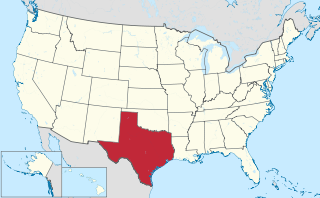
Following is a table of United States presidential elections in Texas, ordered by year. Since its admission to statehood in 1845, Texas has participated in every U.S. presidential election except the 1864 election during the American Civil War, when the state had seceded to join the Confederacy, and the 1868 election, when the state was undergoing Reconstruction.

The 2020 United States presidential election in Texas was held on Tuesday, November 3, 2020, as part of the 2020 United States presidential election in which all 50 states plus the District of Columbia participated. Texas voters chose 38 electors to represent them in the Electoral College. In a popular vote the Republican Party's nominee, incumbent President Donald Trump, and running mate Vice President Mike Pence won all the electors against the Democratic Party's nominee, former Vice President Joe Biden, and his running mate California Senator Kamala Harris.

The 2004 Texas Republican presidential primary was held on March 9 in the U.S. state of Texas as one of the Republican Party's statewide nomination contests ahead of the 2004 presidential election. Incumbent George W. Bush won the primary in a landslide.
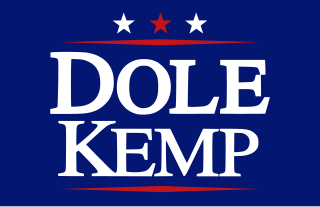
The 1996 presidential campaign of Bob Dole began when Republican Senator and Senate Majority Leader Bob Dole formally announced his candidacy for Republican Party nomination in 1995. After beating other candidates in the primaries, he became the Republican nominee, with his opponent being Democratic incumbent President Bill Clinton in the 1996 presidential election. Dole conceded defeat in the race in a telephone call to Clinton on November 5, 1996.

Wesley Parish Hunt is an American politician and veteran serving as the U.S. representative for Texas's 38th congressional district since 2023. He is a member of the Republican Party.
